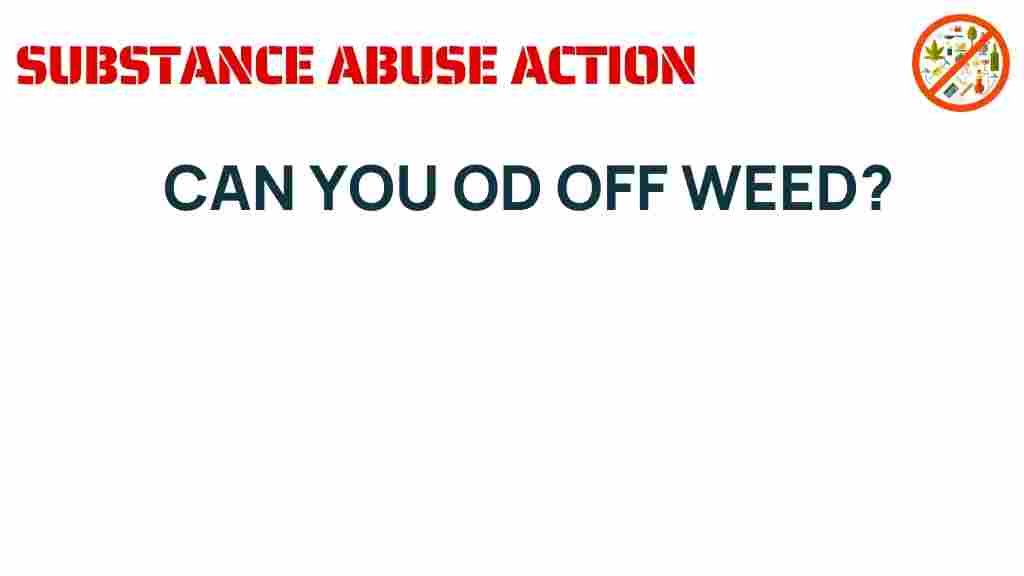Can You Overdose on Weed? Unpacking the Myths and Facts
As cannabis becomes increasingly legalized and accepted in various parts of the world, it’s essential to address the common concern surrounding its use: can you overdose on weed? Understanding the health risks associated with cannabis, particularly the psychoactive compound THC, is vital for both casual users and those considering its medicinal properties. In this article, we will debunk myths, present factual information, and discuss the safety of marijuana use.
Understanding Cannabis and THC
Cannabis, often referred to as marijuana, contains various compounds known as cannabinoids, with THC (tetrahydrocannabinol) being the most well-known. THC is responsible for the psychoactive effects that many users seek. It binds to cannabinoid receptors in the brain, leading to various effects, including euphoria, altered perception, and relaxation.
While cannabis has potential therapeutic benefits, it is crucial to understand the implications of its use, especially concerning the concept of overdose.
Defining Overdose in the Context of Cannabis
In general terms, an overdose refers to consuming a substance in quantities that exceed the body’s ability to process it safely, leading to harmful or potentially fatal consequences. However, with cannabis, the situation is more complex.
Unlike substances such as opioids or alcohol, where overdose can lead to death, the lethal dose of THC is significantly higher than what a user can realistically consume. According to research, the median lethal dose (LD50) of THC is estimated to be around 1,260 mg/kg in rats, which translates to a massive amount in humans—far beyond typical recreational or medicinal doses.
Health Risks Associated with High Doses of THC
While a fatal overdose on cannabis is extremely unlikely, consuming excessive amounts of THC can lead to uncomfortable and distressing effects. Some of these health risks include:
- Anxiety and Paranoia: High doses of THC can trigger anxiety, panic attacks, and paranoia, particularly in inexperienced users.
- Psychotic Episodes: In rare cases, high THC consumption can lead to temporary psychosis, characterized by hallucinations and disorientation.
- Increased Heart Rate: THC can cause tachycardia, or an increased heart rate, which might be dangerous for individuals with pre-existing heart conditions.
- Nausea and Vomiting: Consuming too much cannabis can result in cannabinoid hyperemesis syndrome, leading to severe nausea and vomiting.
Myths About Cannabis Overdose
Several myths surrounding cannabis overdose can create confusion and fear. Let’s debunk some of the most common misconceptions:
Myth 1: You Can Die from a Cannabis Overdose
Fact: As previously mentioned, the potential for a fatal overdose from cannabis is extremely low. While excessive consumption can lead to uncomfortable experiences, it is unlikely to be life-threatening.
Myth 2: All Cannabis is the Same
Fact: Cannabis comes in various strains and forms, each containing different levels of THC and other cannabinoids. The potency can greatly affect the risk of adverse effects. Always check the THC content before consuming cannabis products.
Myth 3: Edibles are Safe from Overdose
Fact: Edibles can pose a higher risk of overconsumption due to their delayed effects. Users may underestimate the potency, leading to excessive intake. Start with a low dose and wait at least two hours before consuming more.
Safe Use of Cannabis
Understanding the health risks and being aware of the myths is crucial for safe cannabis use. Here are some tips for responsible consumption:
- Start Low and Go Slow: If you’re new to cannabis or trying a new product, start with a low dose. This approach minimizes the risk of unpleasant effects.
- Know Your Limits: Pay attention to how your body reacts and know when to stop. Avoid consuming more if you start feeling uncomfortable.
- Choose the Right Environment: Use cannabis in a safe and familiar environment, preferably with trusted friends who can support you if you experience adverse effects.
- Stay Informed: Educate yourself about the different strains and their THC levels. Opt for strains that suit your experience level and desired effects.
What to Do If You Overconsume Cannabis
If you find yourself feeling unwell after consuming too much cannabis, here are some troubleshooting tips:
- Stay Calm: Remind yourself that the effects are temporary. Practice deep breathing or meditation to help reduce anxiety.
- Hydrate: Drink water to stay hydrated. Avoid alcohol or caffeine, as they can exacerbate anxiety.
- Rest: Find a comfortable place to relax. Lying down in a quiet, dimly lit room can help ease discomfort.
- Seek Help if Necessary: If you experience severe symptoms such as intense anxiety or a rapid heartbeat, don’t hesitate to seek medical attention.
Addressing Cannabis Addiction
While cannabis is not considered physically addictive in the same way as substances like opioids or alcohol, it can lead to psychological dependence in some individuals. Understanding the signs of cannabis use disorder can help users maintain a healthy relationship with marijuana:
- Cravings: A strong desire to use cannabis, especially during stressful situations.
- Inability to Stop: Difficulty in reducing or controlling cannabis use despite wanting to cut back.
- Neglecting Responsibilities: Ignoring work, school, or personal obligations in favor of using cannabis.
If you or someone you know is struggling with cannabis use, consider reaching out to a mental health professional or support group.
Conclusion
In conclusion, the idea of overdosing on cannabis is largely a myth. While high doses of THC can produce uncomfortable effects and pose health risks, the likelihood of a fatal overdose is extremely low. By understanding the facts about cannabis, being aware of the health risks, and practicing safe use, individuals can enjoy the benefits of marijuana responsibly.
Always remember that education is key to safe substance use. If you’re looking for more information on cannabis safety, check out this comprehensive guide on cannabis use. And for professional help regarding substance use, consider reaching out to mental health resources available in your area.
Stay informed, use wisely, and enjoy the journey of cannabis exploration safely!
This article is in the category Health and created by SubstanceAbuseAction Team
